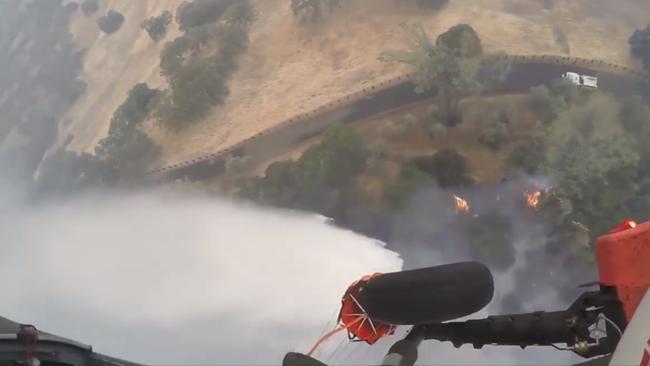Climate change is putting us in the firing line
AS a firefighter, I’ve watched northern hemisphere blazes with horror. And as a farmer I’ve watched our drought with the same reaction. We need to take action — now, writes Vivien Thomson.

AS someone who has made a career out of fighting fires in rural Australia, I have watched the fires raging across the northern hemisphere with a great deal of empathy.
There’s also the concern for my international colleagues, many of whom might not have experienced such severe or prolonged fire events before.
The burning across the world is unprecedented: fires north of the Arctic Circle, the Mendocino Complex fire is California’s largest, and deadly blazes in Spain and Portugal. All this is taking place against the backdrop of a relentless heatwave, with temperatures nearing record-highs of 48 degrees Celsius in Europe.

Here in Australia, our brief midwinter respite from bushfires has come to an abrupt end with fires starting up in south Queensland, northern NSW and Western Australia this week. Much of Australia is, of course, in a severe drought.
We are seeing a worrying trend in Australia and the rest of the world: Instead of a fire season that fits neatly into the summer months and predictable locations, we are heading swiftly towards a global, year-round fire season.
Personally, this year-round fire risk means there’s no let-up from worrying about fires on our family farm in Muttama, NSW — which is already struggling with drought. We are constantly stressed and on edge about the immediate risk of fires and animal losses.

Being in “reactive” mode all the time means less time to get ahead of the curve and plan for the future — to put in place resources and strategies that will make us more resilient to extreme weather risks in the years to come.
Professionally, I know all too well the toll this takes on regional communities, public resources, and firefighters — many of whom are volunteers.
Volunteer firefighters get involved out of an inherent need to help their community; but they also need some down time to take stock and psychologically prepare for the next season. As hot and dry weather makes fire seasons a year-round phenomenon, the demands on their time will grow, and they will have less time to chill out and unwind after a fire season.
This will inevitably stretch the capacity of volunteer firefighters to the limit, and affect our families, our careers, and the community we so love.

To cope, we’ll need more volunteers, and more resources to support our people in the field — which equates to more money and time.
Rural areas affected by major fires will also see long, protracted recovery periods become the norm, and this will no doubt take a toll on communities as they compete for resources, support and recognition.
Right now, there is a strong sense that the fires in parts of the world — and at times of the year — that they never have occurred in before are an aberration, and an anomaly.
But if the impacts of climate change continue unabated, this could be the new normal.
For everyone that understands climate change — from our youth to our firefighters to our farmers — the solutions are blindingly obvious.
We need our policymakers to take urgent action on global warming, starting with putting an end to burning fossil fuels, which are the single biggest source of greenhouse gas emissions.
The catastrophic impacts of climate change are right at our doorstep — and the solutions are right at our fingertips.
As a firefighter, standing by and doing nothing is as incomprehensible as showing up to a blaze with a hose, but refusing to turn it on.
Vivien Thomson is a firefighter and farmer from NSW, and was awarded the Australian Fire Service Medal in 2004.
Originally published as Climate change is putting us in the firing line


